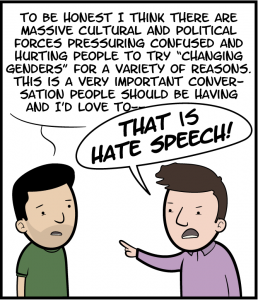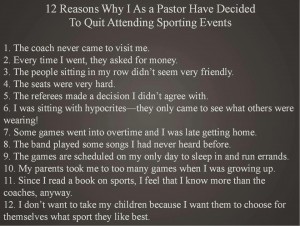[Content Note: Homophobia, transphobia, mentions of anti-gay and anti-trans violence, mentions of suicide]
My niece posted a link to this webcomic earlier today. I decided the webcomic artist deserved a response.
Dear random Christian dude who wants to reassure me he doesn’t hate me by writing a lengthy and completely impersonal webcomic,
Look, I get it. Your uncomfortable with the fact that many LGBT people think of socially conservative Christians as hateful. The thing you need to understand is that A LOT of your fellow Christians do indeed act terribly hateful. Some of them may even be people that you and your church support and revere.
Plus, the other thing you need to understand is that you don’t have to be screaming obscenities or anything equally obvious to act in ways that are hurtful and even come across as hateful. So let me do you a favor and go through your webcomic and point a few things out to you that you get terribly wrong.
I am a Christian who believes the Bible is the Word of God, any homosexual practice is sinful, and marriage will only ever be the life-long union between one man and one woman.
But I promise you, I don’t hate you.
You know, it’s hard to believe you don’t hate me — or at least that you have my best interests in mind — when your first volley in your “reassurance” is to state unequivocally that you will never consider any emotionally and sexually intimate relationship that I might build with someone to be anything other than irredeemably sinful and illegitimate. I mean, you could have started demonstrating your commitment to loving LGBT people by talking about what you are trying to get the church to do about the fact that many states still allow employers to fire people simply for being LGBT. Or you could have talked about what you’re trying to get the church to do about anti-LGBT violence — especially violence against transgender people who are most often targeted. Or you could have talked about what you want to do about the problem of increased instances of homelessness and suicide rates among LGBT youth.
I could go on, but I think you get the point. There are a lot of very real problems that LGBT people face, and you could be doing something right now to help alleviate and address those problems. But instead, you decided to start by drawing your line in the sand. Or let’s call it what it really is, your chosen battle line. Try and understand just how false that makes the rest of your claims sound.
The world sets us up as polar opposites, though. It says we’re bitter enemies in a “culture war,” lobbing Molotov cocktails at each other on the front lawn of the White House.
Do you know who actually uses the phrase “culture war” regularly, and insists they’re fighting one. Many of your fellow Christians. People at the AFA. People at the FRC. People at Focus on the Family. Pat Robertson. These are extremely visible and powerful Christians. They’re the ones pushing the “culture war” framing. And that’s when they’re not comparing LGBT people to sexual predators, calling us mentally ill, or saying God sent AIDS to punish us. There are a lot of other terrible things they say, too. I encourage you to do some research.
So my question to you is what are you doing to real in your fellow Christians who are pushing this “culture war” frame? Are you pushing back and telling them to shut up? Are you making sure that neither you nor your church supports the Christian organizations that are actually promoting and acting as aggressors in the culture war? Or are you just remaining silent and hoping that I and every of LGBT person will magically know you don’t agree with them and “aren’t like those Christians” (or believe it just because you say so)?
If you are gay, your fallen heart tells you to lust after people of the same sex.
God calls that sin.
My fallen heart tells me to lust after people of the opposite sex who are not my wife.
God calls that sin.
Did you notice the major difference between those two statements. You see, according to you, God offers you a context in which you’re allowed to embrace and explore your sexual desires. But according to you, God offers LGBT people no such context. Any such exploration we may consider is sinful. Full stop. End of story. Try to understand how cruel that makes your vision of God in my eyes.
Also, stop to consider how you’ve just implicitly reduced all same-sex relationships to nothing more than sexual gratification. You’ve completely ignored and invalidated the fact that many same sex relationships also involve deep emotional intimacy, mutual care, nurturing, and many other qualities that I’m sure you value in your own marriage. Again, when you start trying to caricature our relationships to fit your “sin” narrative, it’s rather difficult to accept that you’re as hate-free as you claim.
The liberal “churches” which are now saying, “Oh hey! God changed his mind and is totes cool with the gay stuff now 4 real!” do not really love you. They want your approval.
Sounds to me like you need to write a follow-up comic to let liberal churches know you don’t hate them, too. Though I’m not sure they’ll believe you any more than I believe you. But on a more serious note, I think it’s entirely condescending of you to claim you know the hearts and motives of others. Also, I’ll note that many of those liberal churches have actively backed their claims of love by actively doing things to address all of those serious issues facing LGBT people that I mentioned earlier. You haven’t done that yet. I trust you’re familiar with he phrase “action speaks louder than words.”
Not because I say so; because God says so. (See: entire Bible)
There’s a problem with that claim — and it’s really relevant to your rather disparaging comments that liberal churches say God “changed his mind” by the way. People have been saying “God says so/the Bible says so” for centuries, only to later decide that maybe the Bible doesn’t actually say that after all. I mean, there was once a time when many Christians insisted that the Bible said that it was okay to own slaves. In fact, at least one denomination (hint: it’s the largest and most well-known Baptist denomination in the United States of America) was founded on the principle that the Bible clearly states that slave-owners are allowed to own slaves. I don’t know any Christian who would insist that the Bible says that anymore. I doubt that you or any of your fellow Christians today would phrase that change in belief or interpretation of the Bible as “Oh hey! God changed his mind!”
Truth of the matter is, the Bible is hugely open to interpretation and always has been. There have been huge arguments over what the Bible allegedly says, and people on both sides of many of those arguments have insisted that the Bible “clearly says” whatever position they happen to hold. So please, accept that liberal Christians might actually legitimately come to a different interpretation of the Bible, lest you fall into the hubris of thinking you are the authority of what the Bible says. Trust me, history is rife of examples of why that may not end so well for you.
Repent and believe that gospel.
The word “gospel” means “good news.” I ask you, what “good news” are you offering to LGBT people. Quite frankly, I don’t find “you have to live your entire life without any sort of sexual or emotional fulfillment or intimate companionship” to be all that good of news. Can you do it? Why not? After all, the Bible also makes it clear that it would be better for you to remain unmarried. And yet, you mentioned having a wife. Why are you trying to place burdens on other people that you have not accepted for yourself?
We love you, so we must tell you the truth.
Okay. You’ve told me. You’re at least the 100th person to tell me this. (Seriously, do you really think LGBT people have never heard all of this before? You might want to check your facts.) I’m telling you, I don’t buy it and it stinks like yesterdays garbage after it’s sat in the sun all afternoon.
But while we’re on the topic of how much you allegedly love me, let me ask you something: What good is love without relationship. You don’t know me. You haven’t taken a single moment to get to know me. You haven’t listened to my story or shared in my joys or my woes. To be frank, all you’ve done is preach at me, possibly hoping that the cutesie webcomic format will make it more tolerable. If your love is that impersonal and impersonal, then I think I’ll still with the “vote seekers” and “approval seekers.” Once again, at least they seem to understand some of the real and serious problems I and many like me face and are actively trying to do something. They’ve shown real, tangible acts of love.
So thanks, random dude who knows nothing about me and likely will do absolutely nothing to change that. I hope that your webcomic gave you that sense of “being loving” you were trying to create for yourself. It did absolutely nothing for me.
Best wishes,
Jarred.
A gay man who just doesn’t quite believe you.
Moderation Note: This is a no proselytizing thread. Comments trying to convince me that I need to “repent” will be deleted. Commenters that repeatedly ignore this rule will be banned. But don’t worry, there’s no need for you to tell me the truth. Adam Ford has already taken care of it. You can even see the proof for yourself.


